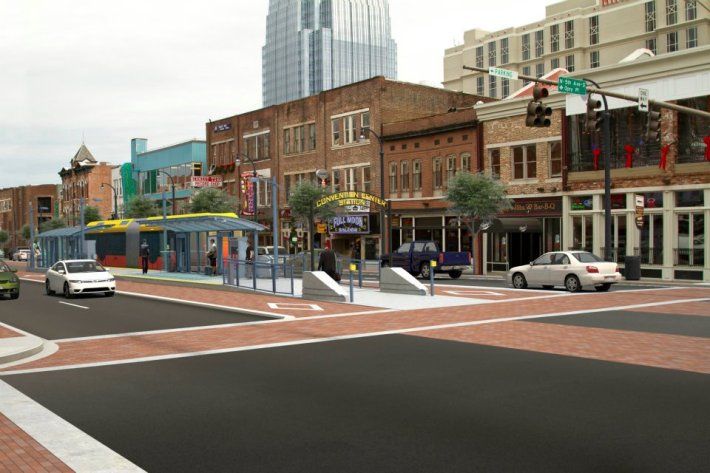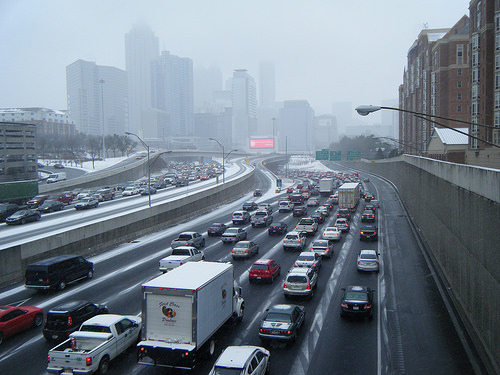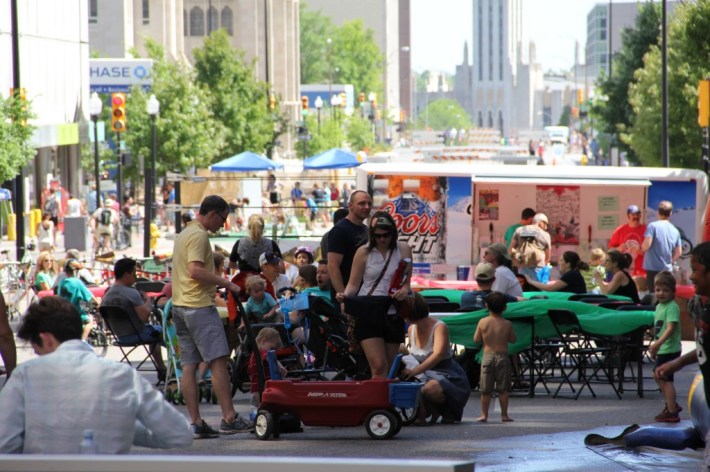You’re back! I hope the first day of the new year was everything you’d hoped. Here at Streetsblog, we’re wrapping up the 2014 Streetsie Awards.
First, the Streetsie for Most Disappointing Decision goes to:

Nashville. Advocates started out the year worrying that city officials were going to water down the plan for center-running bus lanes in the AMP BRT project. By the end of the year, the situation was even more dire. Mayor Karl Dean, previously one of AMP’s major boosters, announced in October that he wasn’t going to pursue funding for it in the next year, punting the question to the next mayor while simultaneously making it more politically difficult for any successor to take it on. So, that sucked.
Favorite Success Story From an Unlikely Place

Lakewood, Ohio, which has no school bus system because every child lives within walking distance of school. The district considers walkability “one of their brands.” Nationwide, only 13 percent of kids under high school age walk or bike to school -- a steep drop compared to previous generations of students. It’s comforting to see at least one suburb bucking the trend.
Most Pressing Task for 2015
Building Vision Zero into a national movement. The Vision Zero movement started with a national campaign, so if Sweden can do it, why can’t the United States? A national symposium in October got the juices flowing but no one has yet figured out just what role Congress and U.S. DOT have to play in eliminating traffic deaths.
Note that “passing a long-term transportation bill” wasn’t even one of the options for voting because, really, who expects that to happen in 2015? I mean, Congress, please, go ahead and surprise me and I’ll be the first to withdraw this prediction.
Hell on Wheels

Sharlene Simon, who killed 17-year-old Brandon Majewski with her SUV while he was riding his bike and then sued Majewski’s grief-stricken parents over her own ”great pain and suffering,” won the Hell on Wheels Streetsie Award. And man, it’s hard to think of anyone more deserving. The “Stand by Sharlene Simon” Facebook page asserts, “It has been determined that the bicyclist's negligence is the proximate cause of Sharlene's PTSD and therefore the cost of counseling will be covered by settlement proceeds.”
Simon, by the way, faced no charges related to the crash. Which brings us to our next Streetsie award:
Worst Policing
Now, this was quite a year for biased and abusive policing, and no one would claim that bicyclists and pedestrians bore the brunt of it. But there were still some pretty sick definitions of justice out there being perpetuated by the men and women in blue, and here in DC we saw some of the worst of it.
The DC police had the audacity to ticket a dead man, who had been killed on the John Phillip Sousa Bridge across the Anacostia River after one of last winter’s many snowstorms. The city had neglected to shovel the snow on the sidewalk, so 61-year-old Joseph Brown was walking in the street, and a driver hit him with a pickup truck. But Brown was the one the DC police decided to go after -- even dead. A few months later, the DC police graced the community with a repeat performance, ticketing cyclist Evan Wilder in the hospital after a crash that he claims was the result of road rage.
Worst Doomsday Sprawl Scenario

Atlanta. Granted, car-dependency and decentralized growth certainly weren’t the only causes of last January’s disastrous snowjam, but it’s easy to see that a more compact city with more varied transportation options could have weathered the storm differently. In a walkable city with robust transit options and more development concentrated in the urban core, perhaps not so many children would have spent the night separated from their parents. Perhaps fewer parents would have spent the night curled on grocery story floors, unable to get home.
The “Don’t Call It a Comeback” Award

Maybe we just get a little misty about this one because we like to think we had something to do with it, but Tulsa, Oklahoma, winner of Streetsblog's 2013 "Golden Crater" for its stunning expanse of downtown surface parking, held an Open Streets event right in the middle their parking crater. The organizers cited the cheeky award as a "wake-up call" and held a design competition, which they called the Golden Crater, to transform the area.
Most Devastating Loss
James Oberstar, who served on the House Transportation and Infrastructure Committee for 36 years, died in May at the age of 79. He was the architect of federal walking and biking programs and led the negotiations on the last major transportation bill the country has had -- SAFETEA-LU in 2005. He will be remembered, among many other things, for his great passion for the outdoors and for active transportation.





